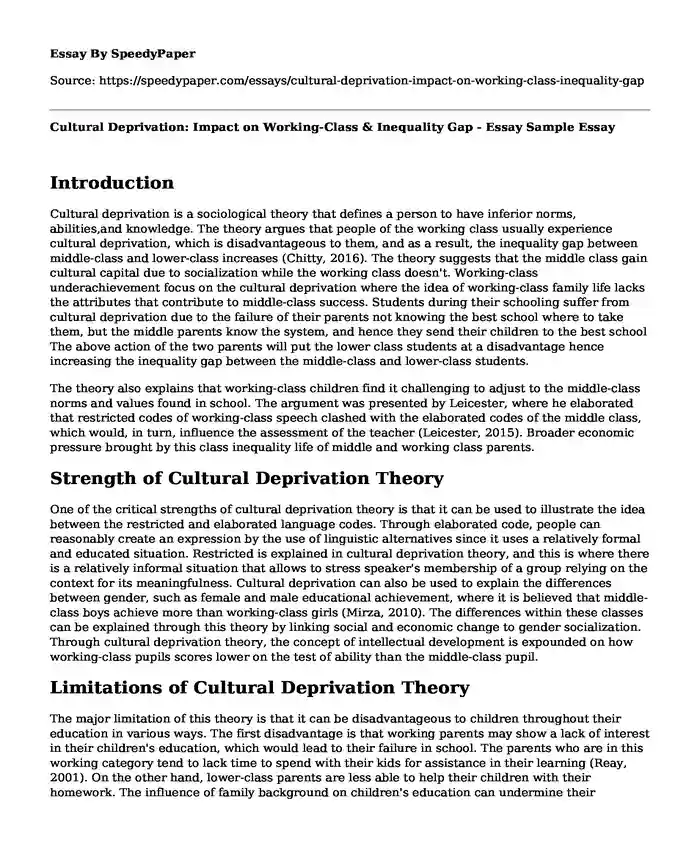
| Type of paper: | Essay |
| Categories: | Culture |
| Pages: | 3 |
| Wordcount: | 747 words |
Introduction
Cultural deprivation is a sociological theory that defines a person to have inferior norms, abilities,and knowledge. The theory argues that people of the working class usually experience cultural deprivation, which is disadvantageous to them, and as a result, the inequality gap between middle-class and lower-class increases (Chitty, 2016). The theory suggests that the middle class gain cultural capital due to socialization while the working class doesn't. Working-class underachievement focus on the cultural deprivation where the idea of working-class family life lacks the attributes that contribute to middle-class success. Students during their schooling suffer from cultural deprivation due to the failure of their parents not knowing the best school where to take them, but the middle parents know the system, and hence they send their children to the best school The above action of the two parents will put the lower class students at a disadvantage hence increasing the inequality gap between the middle-class and lower-class students.
The theory also explains that working-class children find it challenging to adjust to the middle-class norms and values found in school. The argument was presented by Leicester, where he elaborated that restricted codes of working-class speech clashed with the elaborated codes of the middle class, which would, in turn, influence the assessment of the teacher (Leicester, 2015). Broader economic pressure brought by this class inequality life of middle and working class parents.
Strength of Cultural Deprivation Theory
One of the critical strengths of cultural deprivation theory is that it can be used to illustrate the idea between the restricted and elaborated language codes. Through elaborated code, people can reasonably create an expression by the use of linguistic alternatives since it uses a relatively formal and educated situation. Restricted is explained in cultural deprivation theory, and this is where there is a relatively informal situation that allows to stress speaker's membership of a group relying on the context for its meaningfulness. Cultural deprivation can also be used to explain the differences between gender, such as female and male educational achievement, where it is believed that middle-class boys achieve more than working-class girls (Mirza, 2010). The differences within these classes can be explained through this theory by linking social and economic change to gender socialization. Through cultural deprivation theory, the concept of intellectual development is expounded on how working-class pupils scores lower on the test of ability than the middle-class pupil.
Limitations of Cultural Deprivation Theory
The major limitation of this theory is that it can be disadvantageous to children throughout their education in various ways. The first disadvantage is that working parents may show a lack of interest in their children's education, which would lead to their failure in school. The parents who are in this working category tend to lack time to spend with their kids for assistance in their learning (Reay, 2001). On the other hand, lower-class parents are less able to help their children with their homework. The influence of family background on children's education can undermine their education, especially when the parent is in the lower class. This can be explained by even the choice of toy the parent purchase for their kids where it is believed that working-class mother is more likely to choose toys which encourage their thinking and reasoning as compared to lower class mother choice of toys.
Another critics and limitation of this theory is its assumption that schools are meritocratic, and it plays little or no part in encouraging differential achievement. The concept of the working-class parent, both black and white, not valuing education is another limitation and critics of this theory, where Lynch explains that the idea is misplaced and misdirected (Lynch, 2001). Lynch argued that the working-class valued and took a keen interest in their children's education, but they felt excluded from participation in decision making by schools, unlike the middle parents.
References
Chitty, C. (2016). Cultural deprivation theory in society. Journal of Sociology of Education Columbia University Press. ISBN 978-0-231-05357-0. http://www.sociology.org.uk/notes/sctv_sim_cultural%20deprivation.pdf
Leicester, M. (2015). Having equal Opportunities in School: Social Class, Race, and Gender, Harlow, Longman. https://www.slideshare.net/kirstyodair/as-sociology-unit-2-education-cultural-deprivation
Lynch, A. (2001). Parental involvement, social class, and educational disadvantage. British Journal of Sociology of Education DOI 10.1080/01425690120102845 vol 23
Mirza, L. (2010). Gender Gap in Educational Achievement. London Journal of Sociology of Education, 17: 163-176. http://banmarchive.org.uk/collections/mt/pdf/10_77_317.pdf
Reay, D. (2001). Working-class relationships to education, Journal of Education Policy 16(4): 333-346. https://www.tandfonline.com/doi/abs/10.1080/02680930110054335?journalCode=tedp20
Cite this page
Cultural Deprivation: Impact on Working-Class & Inequality Gap - Essay Sample. (2023, Sep 13). Retrieved from http://land-repo.site.supplies/essays/cultural-deprivation-impact-on-working-class-inequality-gap?pname=speedypaper.com
Request Removal
If you are the original author of this essay and no longer wish to have it published on the SpeedyPaper website, please click below to request its removal:
- Free Essay on Intercultural Communication Barriers and Solutions Between Nigeria and China
- Free Essay: International Organization Concepts in the Example of Henkel Company
- Essay Sample Defining Organizational Psychology and Leadership
- Essay Sample on Role of Institutions in the Transfer of Human Resource Practices
- The Overall Effectiveness of a Coalition - Free Essay
- Free Essay Sample on Company Aspects
- Paper Sample on Changing Organizational Culture
Popular categories




